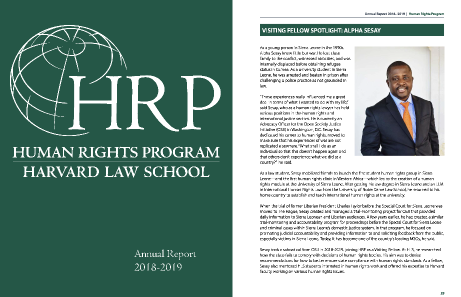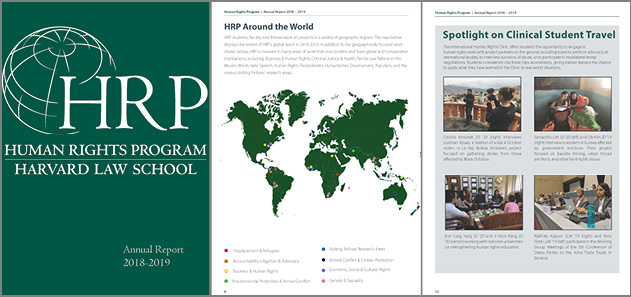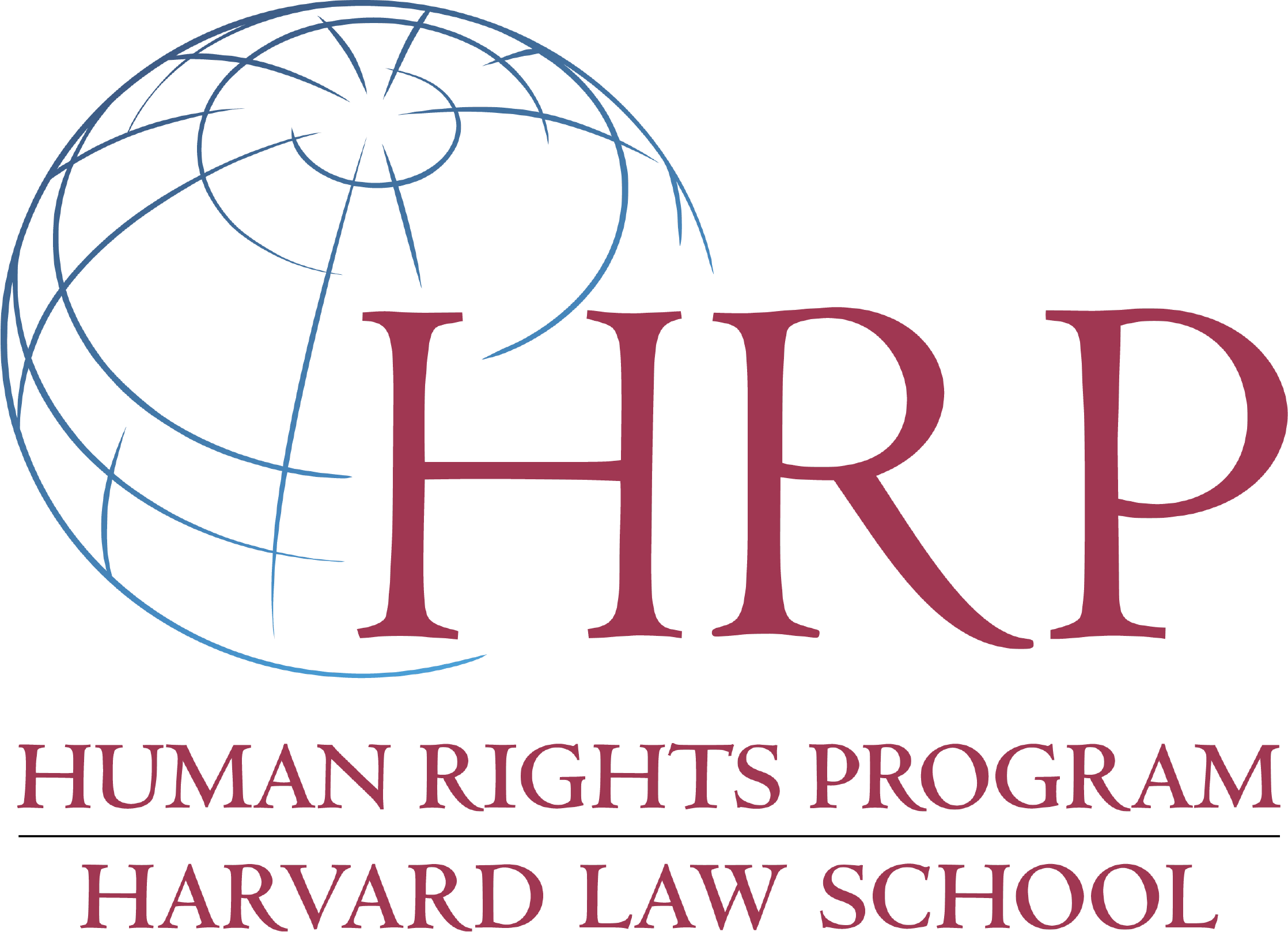
HRP’s 2018-2019 Annual Report

We are delighted to present HRP’s 2018-2019 Annual Report. The report showcases the global reach and impact of the Human Rights Program in its 35th year. Previews have already run on the Harvard Law School website: profiles of Paras Shah JD ’19, Jenny B. Domino LLM ’18, and Anna Khalfaoui LLM ’17. In addition to celebrating these former students and fellows, the annual report explores how members of HRP contributed to a convention on crimes against humanity, innovated in clinical pedagogy, and advocated for LGBT rights. We thank all of the students, partners, and alumni who made last year so strong and look forward to engaging with our community and working on the most pressing issues in 2019-2020.
You can view our annual report in several different modes: a flipbook version, a color PDF, and a black-and-white PDF.
Read the introduction below, which highlights the words of the Human Rights Program and International Human Rights Clinic Co-Directors:
The Human Rights Program: Reflecting on 35 Years
Founded by Professor Emeritus Henry Steiner in 1984 as a center for human rights scholarship, Harvard Law School’s Human Rights Program (HRP) enters its 35th year in 2019. Concurrently, the International Human Rights Clinic celebrates its 15th anniversary. HRP was founded as a place of reflection and engagement and a forum that brings academics and advocates together. Since 1984, HRP has only deepened its commitment to this endeavor. With this past year marking the 70th anniversary of the signing of the Universal Declaration of Human Rights (UDHR) by the United Nations General Assembly, it is a particularly opportune time to take stock of human rights at Harvard Law School (HLS) and how the Program’s impact has reverberated beyond the university.
“The Universal Declaration set forth a vision of liberty and equality and social solidarity that has never been fully achieved; it continues to inspire people around the world as we strive to fulfill its mission,” said Gerald L. Neuman JD ’80, Co-Director of HRP and the J. Sinclair Armstrong Professor of International, Foreign, and Comparative Law at HLS. “The Program has always been about critical involvement with human rights. In a time when human rights face extreme challenges globally, that means thinking more deeply about what changes are needed and how we can contribute to the system, scholarship, and the world.”
Today, HRP comprises the Academic Program and the Clinic, which together bridge theory with practice and engage with pressing human rights issues around the world. As a center for critical thinking, the Academic Program organizes conferences and other events; publishes working papers and books; offers summer and post-graduate fellowships to launch students in human rights careers; and draws human rights advocates and academics from across the globe as part of the Visiting Fellows Program.
Over the past decade and a half, the Clinic has engaged more than 1,000 students in an analytical and reflective approach to human rights lawyering. While devoting itself to the training of future practitioners, the Clinic has promoted and protected human rights through scores of projects around the world. This work includes pushing for global equity in the realm of gender and sexuality, litigating landmark accountability cases, and helping to negotiate treaties that ban nuclear weapons and cluster munitions.
“The formal founding of the International Human Rights Clinic 15 years ago is really consequential; it recognizes the diversity of ways that people can contribute to the human rights movement,” said Susan H. Farbstein JD ’04, Co-Director of the Clinic and Clinical Professor of Law. While not all clinical students pursue careers in human rights, they often cite their clinical education as influential and formative. For many, clinics are the one place at HLS where they have the opportunity to engage in real-world preparation and see their efforts make an impact. “We’re training students in critical approaches to human rights practice, emphasizing cross-cultural sensitivity and how to be guided by the clients and communities we serve. We hope this leads to better, more effective human rights advocacy,” Farbstein said.
This year, HRP recognizes the anniversary of the Program, the Clinic, and the UDHR with both celebration and humility. After decades of training students and building a network of HRP fellows and partners, it is inspiring to step back and glimpse the network that we’ve built. “It’s not about one particular year but about the cumulative impact,” said Tyler R. Giannini, Co- Director of HRP and the Clinic and Clinical Professor of Law. “When we see the success of our students, alumni, partners, and fellows, it’s a testament to the power of this community.”
